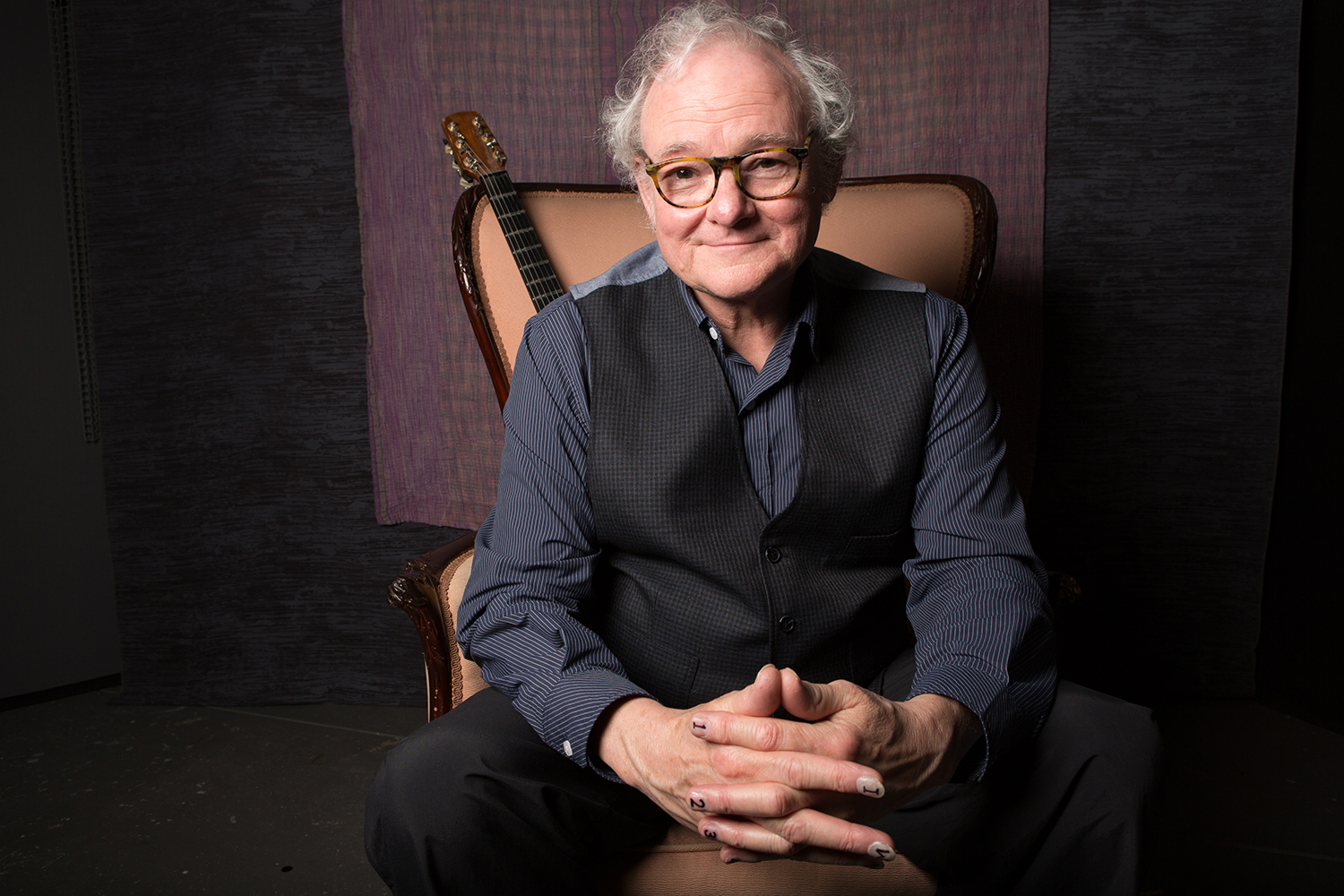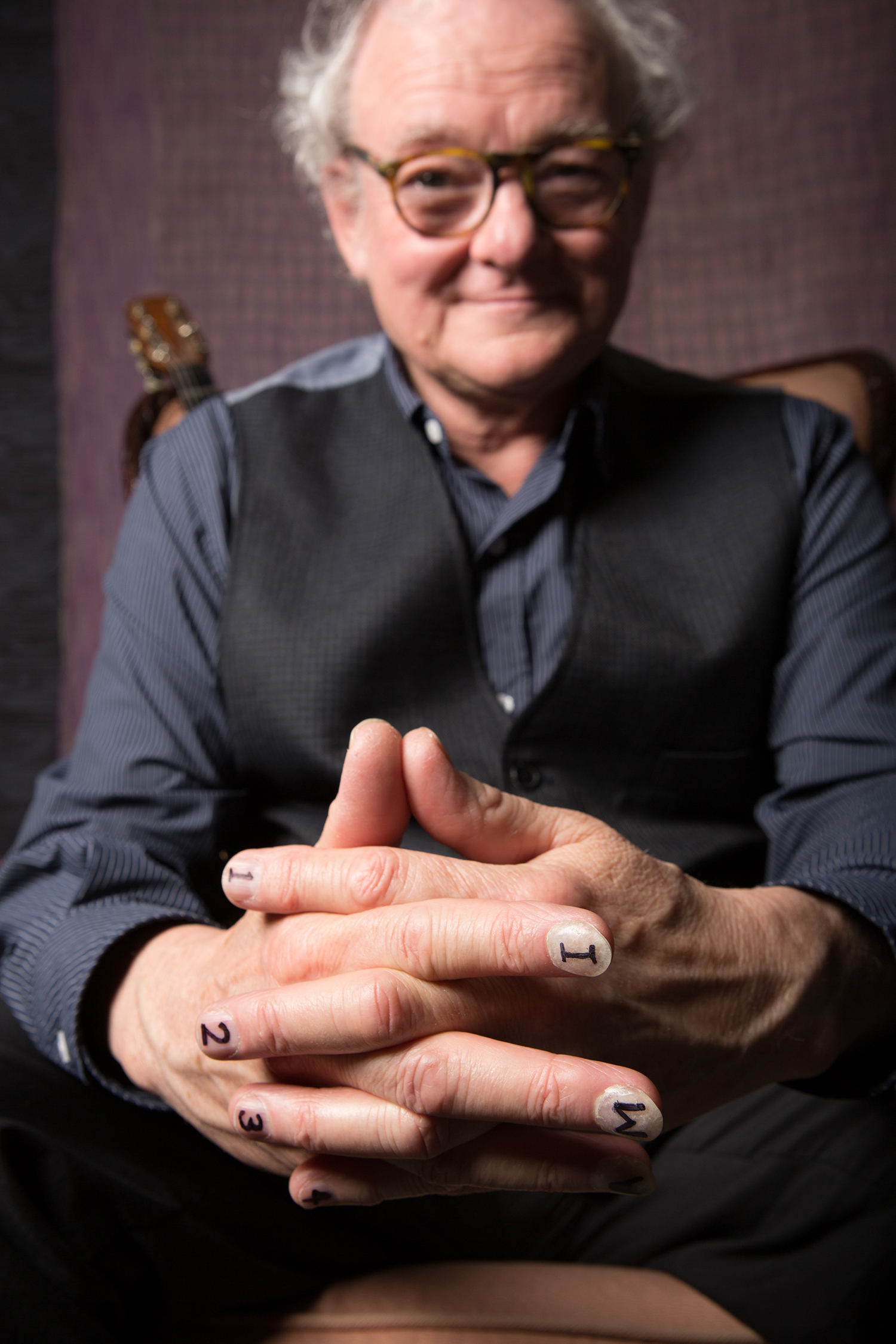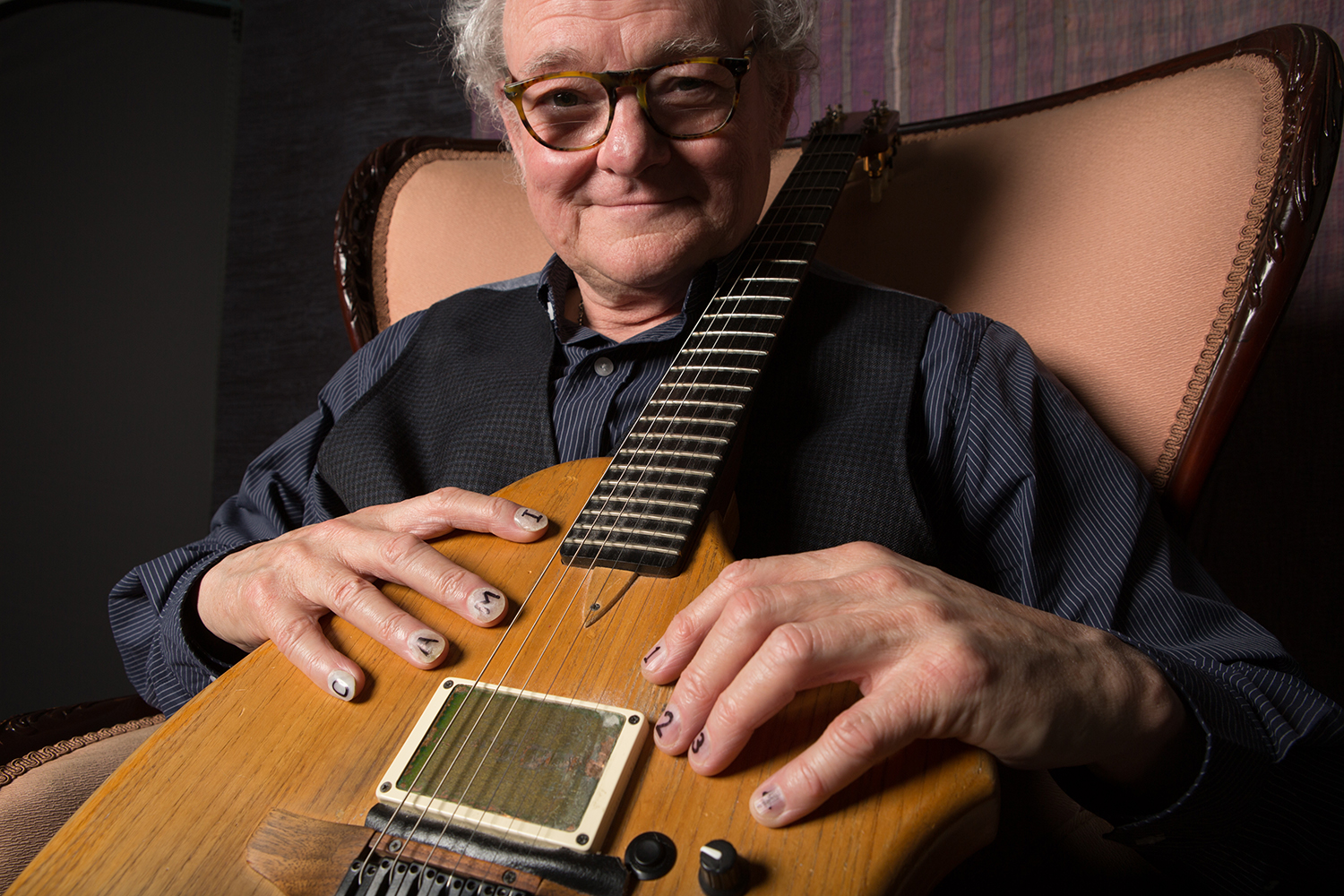I was a fan of Adrian Legg’s music long before I had the opportunity to see him perform live, which finally happened at a crowded and absurdly noisy NAMM convention — not exactly the ideal environment to experience one of your guitar hero’s live performances for the very first time.
This was back in the early days of TrueFire. Internet video was just emerging and we’d scour the show floor, keeping our eyes and ears opened for new and cool things to film and then stream on TrueFire TV.
 My ears perked up when I heard what I thought sounded like “Chicken Lickin’s Last Ride”, one of my fave Adrian Legg tunes. Could it be?! We were several rows away, but our ears beamed us directly to the source — Adrian Legg in the flesh performing live!
My ears perked up when I heard what I thought sounded like “Chicken Lickin’s Last Ride”, one of my fave Adrian Legg tunes. Could it be?! We were several rows away, but our ears beamed us directly to the source — Adrian Legg in the flesh performing live!
Adrian had attracted a massive crowd, which surrounded the booth he was performing in. I could barely see him let alone film, so we just kicked back and soaked in the music along with everyone else. I remember noticing ear-to-ear grins on every single face in that crowd as this dapper gentleman played his brilliant music, on that extraordinary guitar of his.
“There are guitarists, there are axe-wielding maniacs, and then there are wizards. Adrian Legg is one of the wizards. He has enough technique to do just about anything he wants, but also the sensitivity to honor the contours of a melody.”
Readers of RIFF are likely already well aware of Legg’s distinguishing contributions to the world of guitar because he’s earned a massive number of accolades from so many of his peers and the press. My favorite comes from the Philadelphia Enquirer,”There are guitarists, there are axe-wielding maniacs, and then there are wizards. Adrian Legg is one of the wizards. He has enough technique to do just about anything he wants, but also the sensitivity to honor the contours of a melody.”
Working and spending a little quality time with Adrian during each of his sessions at TrueFire always left me wanting more time with him. His intellect, wit, sense of humor, inventiveness, view of the world, and his love of life, are all as extraordinary as his music and guitar.
A film released in 1993, The League of Extraordinary Gentlemen, drew on the works of Jules Verne, H. G. Wells, Sir Arthur Conan Doyle, Ian Fleming, Oscar Wilde, Edgar Allan Poe, Mark Twain, and other like brilliant minds of those times. I could just as easily see Adrian Legg starring alongside Sean Connery in that film, as I could see him sitting around a table, swapping tales with those literary giants. I wish he lived in my neighborhood. I’d find daily excuses for knocking on the door of this gentleman wizard.
I asked Adrian if he would kindly answer our Proust-like questionnaire so that Riff readers could get to know him a little better and he happily complied …
What is it about the guitar that attracted you to it originally, and still fascinates you today?
It was red, had a rich tone, was easy to play right from the get-go, and could be played successfully by a not very bright-looking guy with glasses whom a Strat made sexy, and above all, my parents and teachers hated it. The initial part of it anyway, I guess – Hank Marvin and The Shadows, cheesy though they may be in retrospect, had an enormous impact on my generation. Now the functionality and versatility impress me no end, and I think that is part and parcel of its role as a particularly American cultural tool. America is really where its development from simple acoustic parlor instrument to rock god shred machine and everything in between occurred.
Your idea of happiness?
 Cycling downstream on the Thames Path, in sunshine, with a tailwind. I’m going to do it today right after I click “send”.
Cycling downstream on the Thames Path, in sunshine, with a tailwind. I’m going to do it today right after I click “send”.
Whether living or dead, who would you like to have dinner with?
Paul Bigsby. Nerds have been and still are our enablers. Much of the guitar is about possibility, and while what musicians want drives its development, it’s the nerds who translate our needs from chaotically expressed “How about…?” to functioning practicality. Paul Bigsby’s development of a solid body electric guitar after prodding from his friend Merle Travis is a perfect example of this. I also think it’s funny that the modern solid body shred guitar developed from what a finger-picker wanted, and I hope he’d enjoy that.
Name three things a player can do to improve their musicianship.
1. Practice s-l-o-w-l-y. 2. Practice privately with no one at all listening so you’re not tempted to show off. 3. Do it again until you _can’t_ make a mistake. I think it’s important to remember that when we learn something new, we’re building a kind of procedural code, the flow of which we will manipulate in a performance. Just like computer code, it will become corrupted, frequently by something new we learn that has a similar structure as an old piece in some parts. When an old piece falls apart for no obvious reason, this is usually what has happened, so we have to find the parts that are similar and practice them side by side until we more clearly understand the difference and build that separation into the code.
I could just as easily see Adrian Legg starring alongside Sean Connery in that film, as I could see him sitting around a table, swapping tales with those literary giants. I wish he lived in my neighborhood. I’d find daily excuses for knocking on the door of this gentleman wizard.
If not yourself, who would you be?
I’ve never wanted to be someone else.
Given the changing business landscape of the music business and how tough it is to sell records etc., what are the positives about the current evolution of the music business?
I don’t think the positives are necessarily in the music business per se, but there are positives for us in the technology that undermined the old system. The principle good thing is instant communication – we can stay in touch with the people who like and support what we do. I think there are dangers for us individually in that same technology: It’s now very easy to make backing tracks and avoid the technical challenge of truly playing solo. Obviously, as a soloist, I would say this, but I even hear buskers working with backing tracks now, and I think their music is infertile and stodgy. I’d always rather hear a human being than a machine. Bite the bullet, face the struggle, if you want to make something solo then do it without artificial aids. Backing tracks and loopers are great tools for practicing something we will later perform in an ensemble. Of course, here we all are using online digital technology to teach and learn. I promise you it’s better than the books and chord dictionaries that I could never be bothered with – they were too much like my horrible, rigid, childhood schools.
Your favorite motto?
Sic transit gloria mundi – thus passes the glory of the world. We don’t get long, we must do our thing right now and not be afraid of dying; death will happen – at that point we are excused practice.
What do you dream about? Literally.
I used to dream I could fly and gradually learned to exclude the possibility of crashing. Otherwise, I go with the theory that dreams are the noticeable part of cleaning out short-term memory so that it’s fresh for use the next day. I think that repetitive dreams are when a bit of short-term memory is so vivid during the discharge process it becomes re-remembered and re-established, so I make no effort to remember them. I go to sleep with a piece of music in my mind and try to arrange it.
What are your aspirations?
To write a guitar piece that everyone wants to learn and listen to.
What one event in music history would you have loved to have experienced in person?
I’d like to have seen the first performance of Stravinsky’s “Rite Of Spring” in Paris in 1913 just to see for myself the audience reaction … the stories about it are wonderful.
Your favorite heroes in fiction?
I don’t think I have a favorite. I just like stories.
What or who is the greatest love of your life?
The woman who married me, and the astonishing tribe that resulted.
Your favorite food and drink?
My local, Khan’s on Westbourne Grove, it’s Indian and Pakistani cooking, they have no Muzak and no pretenses – just very good food. Also I admire the stoicism of the Muslim waiters during Ramadan when I tuck into the lunchtime buffet.
In your next life, what or who would you like to come back as and why?
I refer you to ‘sic transit gloria mundi’.
The natural talent you’d like to be gifted with (other than music)?
I’m happy with what I found.
In life or in music, what is the one central key learning that you’d like to pass on to others?
We should practice slowly and privately. We shouldn’t show off until we have a whole story to tell, then we should tell it courteously and accurately, with feeling. We may be wrong, alas.

